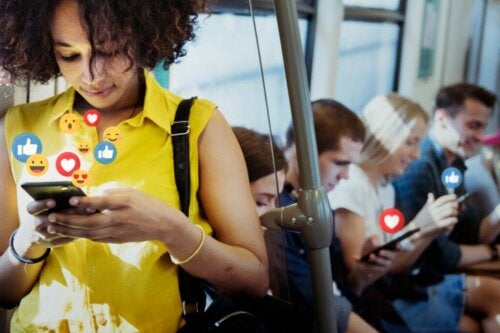A lot of people spend many hours a day on social media. In fact, it’s become our favorite hobby, providing an endless source of entertainment. However, it can also be the cause of self-esteem problems, lack of concentration, and difficulties in relating. Indeed, sometimes, social media makes people unhappy.
On the other hand, this isn’t always the case. In fact, it’s true that social media can provide certain benefits. It’s also true that its disadvantages depend, to a great extent, on the way each individual uses it and how aware they are of the risks. If you’ve felt more apathy, anguish, or loneliness since the arrival of social media, you’re not alone. And, there’s a reason.
The effects of social media on mental health
As we mentioned above, social media isn’t always negative. In fact, it can be a useful tool that provides entertainment and other benefits. For example, thanks to our brain plasticity, social media give rise to new learning methods, the kinds that are already observed in digital natives.
These individuals are more effective at multitasking and also faster at finding answers to specific questions. This was confirmed at the Redes III meeting, organized by the biomedical company Pfizer in 2016.
Furthermore, a study published in Personality and Individual Differences found that, during the COVID-19 quarantine, social media helped reduce psychological distress, thanks to social comparison. It promoted human interaction, as people saw how others were experiencing the same situation of confinement,
In fact, social media can be an excellent way to connect, communicate, and even seek support in difficult times. For example, people with mental health problems might turn to social media platforms to share their experiences, find information and treatment options, and give and receive support from others in similar situations, confirms Naslund et al., 2014 published in PLOS One.
Why does social media make people unhappy?
Social media makes people unhappy when its usage gets out of control or falls into certain patterns.
Dissociation
Have you ever spent hours scrolling through Instagram or Tiktok and completely forgotten the time? Their content is often so absorbing that they abstract us from reality and we find ourselves completely immersed in images and sounds. So much so that we might adopt excessively passive and disconnected attitudes, to the point of not even being aware of what we see and not retaining any information either.
This is known as dissociation. It sometimes leads to pleasurable emotions. For example, it can feel like a mental break if you’re feeling stressed. However, getting lost in this way on social media might make you feel guilty and frustrated, as it leaves you feeling as if you’ve been wasting your time. Consequently, you feel remorseful for being so unproductive, confirms Baughan et al., 2022.
Addiction and lack of concentration
Social media is a constant presence on our cell phones. This availability means we’re always connected, making impulsive and compulsive use of our mobile devices. However, it can generate concentration and self-control problems (Rodríguez & Barrio, 2015). It could even lead to an addiction that ends in dissatisfaction and lack of productivity (Sun & Zhang, 2021).
Psychological well-being
The fact that social media makes people unhappy is clear from research findings published in PLOS One. This study found that the more time people spent interacting with Facebook, the more their affective well-being (how they feel) and cognitive well-being (how satisfied they were with their lives) decreased.
In addition, social media also leads us to compare ourselves with others and to establish ‘tests’ in which, frequently, we lose out (ascending social comparison). Unsurprisingly, this can cause great discomfort and dissatisfaction and has a significant negative impact on our self-esteem (Jan et al., 2017).
Interpersonal conflicts
Finally, social media has repercussions on the way we relate to others. And, since we’re social beings, this harms our well-being. Proof of this lies in the fact that social media leads to us prioritizing individualism over our social groups and becoming intolerant.
Using social media to preserve our well-being
All of the above information doesn’t mean that we should demonize or stop using social media. On the contrary, it serves as an invitation to make us aware of the use we give it. We can take certain measures to ensure that we’re in control and not the other way around. Here are some recommendations in this regard:
- Use social media consciously. Don’t use it to escape from reality or to manage complicated or negative emotions.
- Carefully select the content you consume. Instead of being carried away by what your home page shows, choose nutritious and enriching accounts that provide you with interesting facts or healthy fun. Avoid those that encourage comparison.
- Plan and restrict your usage time. Plan in advance the time you’ll dedicate to looking at social media and for how long, and ensure you comply with that guideline. Use the reminders on your cell phone or activate the options included in many of the apps.
- Don’t fall for the effect of anonymity on the Internet. Remember that behind every account, there’s a human being and that the same respect and consideration you offer in real life should be present during your conversations on the web. This will prevent you from becoming polarized or engaging in hateful actions or unpleasant discussions.
In short, social media makes people unhappy when they don’t take control of their consumption. Therefore, being responsible and making the right decisions will contribute to making your time spent on these platforms satisfactory and safe.
Were We Happier Without Social Media?
The post Why Does Social Media Make People Unhappy? appeared first on Exploring your mind.ok


















Comments